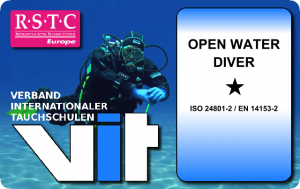Online Training OWD*

Thank you for choosing VIT in your new adventure - scuba diving!
The Open Water Diver* is the entry-level into independent diving. After successful completion of the course, you are entitled, to dive with a more experienced diver (at least VIT Experienced Diver**) in open water in easy conditions without an instructor.
A good and profound diver training is very important so you feel safe from the first moment of diving and you can enjoy a relaxed time underwater. This also requires some theoretical knowledge. But do not worry the subjects in Taucherpedia are put together by our most experienced instructors and designed to make them easy to understand so you enjoy learning! The articles on this page are arranged in lessons in the order that you should go through them during your theory training. It's best to work them out in the order listed below.
Please read the sections of Before your first dive and Basic knowledge for Open Water Diver* (OWD*) of every article carefully.
If there is anything you do not understand, please don't hesitate and ask your VIT instructor.
- Warning
Reading through the lessons and understanding its content does not qualify you as a diver. Diving involves practical skills which can only be mastered under supervision of an instructor. Without mastering these skills or trying to learn them without professional supervision can lead to serious injury or even death.
Contents
The most important things before your first dive
Before you start your first dive with your instructor, be sure to read through the section Before Your First Dive of the following artices. They contain the most important information and safety notices you need to know before your first open water dive.
- Pressure
- Equalization
- Mask
- Fins
- Regulator
- Buoyancy control
- Underwater hand signals
- Medication, intoxicants and stimulants
- Briefing
- Now your theoretical training as Open Water Diver* really starts. Please read the section Basic knowledge for Open Water Diver* (OWD*) of every following article.
Breathe under water
In this lesson you will learn the most important physical facts you need to know while diving. You will also learn about the technical principles and how the equipment works, which allows you to breathe under water.
Pressure on the ears
Already during your first dive you noticed a pressure on your ears and learned what to do. In this an the following section you will deal with the effects of the higher pressure under water on your body.
Lungs and breathing
Never hold your breath - In this lesson you will learn everything about the human breathing system and what you have to take care of while breathing under water.
- Composition of the air
- Respiratory system
- Pulmonary barotrauma
- Hyperventilation
- Breathlessness
- Nitrogen narcosis
Buoyancy control and moving through water
On your first dives, you quickly noticed that movement and buoyancy control - the floating - under water are the real art of diving. In this lesson, you will learn the basics of physics and how the equipment you need works.
Decompression
Do not ascend to fast, do not dive to long and to deep, etc. - You've heard that from your VIT instructor many times. In this lesson, you will learn what happens when you breathe compressed air under water. At the end, you'll learn about the Golden Rules of Scuba Diving, which you must follow to make sure each dive is as safe as any possible for you.
- Nitrogen saturation
- Decompression sickness
- Decompression & dive planning
- Dive computer
- Surface air consumption
- Air consumption calculation
- Diving rules
Sensations and psychology
Seeing, hearing and also feeling the temperature are completely different under water than on the surface. In this lesson, you will learn the causes and how it effects you psychologically.
- Seeing under water
- Mask
- Hearing under water
- Underwater hand signals
- Heat loss
- Protection against cold
- Psychological aspects
Underwater world
You go diving to get to know and enjoy the fascinating underwater world, don't you? With your behavior as a diver, you also take responsibility to preserve the underwater environment in a way that you and your dive buddies can continue to enjoy it.
Next steps in your diving career
With your freshly passed diving license, it is exactly the same as with a driver's license: only practice makes perfect! Go on actively diving and you will notice how quickly you gain experience. As more experienced you become, as easier it becomes and as more you enjoy the fascinating underwater world.
We recommend that you read the articles in the additional knowledge category. They contain additional and more in-depth information that every diver should know.
With continued diving, very soon you are looking for new challenges and adventures. Diving with nitrox, orientation under water, organizing a small diving group, perfect buoyancy, setting a buoy - the VIT offers a wide range of special courses, for which you can continue your education. The next level of qualification you can achieve is the VIT Experienced Diver**. With it, you can show that you have a lot of experience beyond the OWD* training and are therefore able to undertake more demanding dives.
You will find offers for advanced and special courses from our VIT-Divecenters always up-to-date at https://www.vit.info/events.
